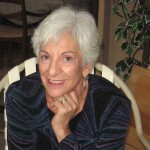Talking With Leita Kaldi (Senegal 1993-96) about her new book In the Valley of Atibon
LEITA KALDI (Senegal 1993-96) worked at the United Nations in New York, UNESCO in Paris, at the Fletcher School of Law and Diplomacy and Harvard University. She then joined Peace Corps and went to Senegal and wrote a memoir about two years entitled, Roller Skating in the Desert. In 1997, she became Administrator of Hospital Albert Schweitzer in Haiti and retired from the hospital in 2002.
Diplomacy and Harvard University. She then joined Peace Corps and went to Senegal and wrote a memoir about two years entitled, Roller Skating in the Desert. In 1997, she became Administrator of Hospital Albert Schweitzer in Haiti and retired from the hospital in 2002.
Leita has now written In the Valley of Atibon. It is her story of Haiti’s Artibonite Valley, where she went as a middle-aged white woman, and filled with good intentions had to deal with young revolutionaires and vagabonds who threatened her life, while also dealing with a hospital and community development program which she tried to manage.
In Haiti Leita would delve into the mysteries of Voudou, and learns first-hand about the undercurrent of terror that drives rural Haitians.
Also, she was inspired by Haitians with whom she worked: doctors, nurses, agronomists, her housemaid, and other people who taught her surprising lessons in dignity, faith and forgiveness.
She retells the tales of her son’s visits, and of how her son ends up marrying a woman of the Haitian elite class, which provides a keyhole for Leita through which she observes the dynamics of class and prejudice among the layers of Haitian society.
In this memoir of her five years at Hospital Albert Schweitzer (HAS) in Deschapelles, Leita also narrates the story of Dr. Larimer and Gwen Grant Mellon, who founded HAS in 1956 and spent their lives serving people in the Valley. Theirs is an uplifting story, though fraught with problems that demanded their courage, resourcefulness and dedication to Haitian people.
That said, I asked Leita a few questions about her own personal life.
Leita, first off. What is your academic background?
I went to Syracuse University, University of Cincinnati, New York University, Tufts and Harvard in Adult Education Programs for many years, but studied only what I liked and did not obtain a degree.
What was the difference, if any, of your experiences in Senegal and then Haiti?
I was not a PCV in Haiti, the site of my book, but my Peace Corps experiences in Senegal were quintessential in obtaining the position of Administrator of Hospital Albert Schweitzer. The Board of Directors needed someone who could survive rather than an expert in the medical profession. In my book I often compare my blissful time in Senegal to the rigors of life in Haiti.
Are you still involved at all with Senegal?
I’m still connected after 20 years, coordinating fund-raising for Africa Consultants International in Dakar. And I collaborate with Haitian organizations to help in any way possible, e.g., through FANM, Haitian Women of Miami.
Are you at all connected to the Peace Corps community here at home?
I’m still connected with Peace Corps through Peace Corps Worldwide, for whom I love to write book reviews of RPCV authors. I belong to the RPCV group of South Florida. I had the privilege of attending 50th anniversary celebrations, and reconnecting with many PC friends.
friends.
How did you go about getting In the Valley of Atibon published?
When I read about having a Peace Corps Imprint through amazon Create Space, I knew that was for me. Marian Haley Beil helped me tremendously with design and layout, and navigating the Create Space process. Create Space staff is also very helpful. I’m delighted with all the results and I learned a lot. Maybe I can do my next book all by mysef.
What’s the next adventure for Leita Kaldi?
Well, I married a gentleman four years ago and find that every day is an adventure with him! My next personal adventure will probably be writing a book about Gypsies/Roma, with whom I spent a lot of time, and have volumes of journals to use as a resource, so I will relive those adventures instead of seeking new ones. But you never know what’s around the corner.
No comments yet.
Add your comment